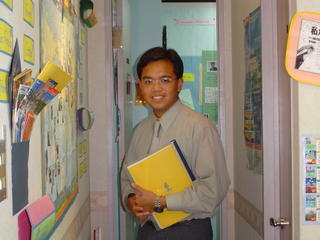ESL: Linguistics
As much as I wish I were a book-smart intellectual (perhaps when I'm done with teaching in Japan I'll go back to the States for an M.A. or higher), I'm not. In the classroom setting, I prefer not to stick to textbooks unless, however, they are quite entertaining and/or arouse discussion, rather than drill information and merely lay out what is proper. I don't care too much for living by rules of usage to the bitter end; having played chess in Washington Square Park, I learned there are exceptions to every rule. And the greatest challenge for me is the most passive student, who puts blind faith in everything that's said and never argues a point or inspires thought.
Allow me to shoot from the hip for a moment and hypothesize that the last point is why people have so much trouble with conservatives, who crush dissent and urge total compliance, and intellectual liberals, who believe their own arguments too much to wonder why they need to defend them. If I'm wrong, my apologies; this is a language article, after all.
I finished grading essays written by the students in my advanced class last week, and we discussed them and the mistakes/errors made in them. For one student, I forgot what word it was we were arguing about, but I said that to a native speaker, the word in that context in that particular sentence would not be understood. A second student argued that he had understood it just fine. In a Japanese way of thinking.
Consider this: I got a laugh out of my Japanese teacher when I said "atama ga kawaru" ("I change my mind"). It was, of course, corrected to "kokoro ga kawaru" ("I change my heart", although kokoro can also mean mind as well). Had an English-speaking student of Japanese come up to me one day and said the former, however, I would have understood it completely, even if I might correct it from experience.
There are at least one or two blogs on Blogger that talk about linguistics; I happen to read a few of them just for comparison. Some of them are very strict when it comes to usage. I tend to filter out that sort of thing, as they present very little value to me when I'm "in the field," as I like to say. Studying politics at NYU was a great experience, and it provided an abstract framework on how to view the world, but beyond that it lacked the potential for immediate, practical usage. I try to look at linguistics in the same way, and hope that my classroom is a little bit closer to Earth than the ones in university.
Especially when there's so much fake English out there in Japan. It is not something that anyone can change; not unless English teachers become better advocates of their own usage to their students without adopting the kind of snobbery that haunts intellectualism. At the same time, Japanese students of English - and, well, any student of English - are also advocates of their usage, and their English, after a certain level of proficiency, is just as valid as ours.
Hey, maybe that's why the textbooks change year after year.




<< Home